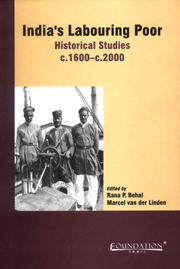Book contents
- Frontmatter
- Contents
- Notes on Contributors
- Frontispiece
- Preface
- Introduction
- Working Across the Seas: Indian Maritime Labourers in India, Britain, and in Between, 1600–1857
- The Brickmakers' Strikes on the Ganges Canal in 1848–1849
- On the Move: Circulating Labour in Pre-Colonial, Colonial, and Post-Colonial India
- Mobility and Containment: The Voyages of South Asian Seamen, c. 1900–1960
- Power Structure, Discipline and Labour in Assam Tea Plantations during Colonial Rule
- “Following Custom”? Representations of Community among Indian Immigrant Labour in the West Indies, 1880–1920
- Masculinity, Respect, and the Tragic: Themes of Proletarian Humor in Contemporary Industrial Delhi
- Stretching Labour Historiography: Pointers from South Asia
- DOCUMENT
- Editorial introduction
- War on the Shopfloor
- Select Bibliography
Editorial introduction
from DOCUMENT
Published online by Cambridge University Press: 05 January 2012
- Frontmatter
- Contents
- Notes on Contributors
- Frontispiece
- Preface
- Introduction
- Working Across the Seas: Indian Maritime Labourers in India, Britain, and in Between, 1600–1857
- The Brickmakers' Strikes on the Ganges Canal in 1848–1849
- On the Move: Circulating Labour in Pre-Colonial, Colonial, and Post-Colonial India
- Mobility and Containment: The Voyages of South Asian Seamen, c. 1900–1960
- Power Structure, Discipline and Labour in Assam Tea Plantations during Colonial Rule
- “Following Custom”? Representations of Community among Indian Immigrant Labour in the West Indies, 1880–1920
- Masculinity, Respect, and the Tragic: Themes of Proletarian Humor in Contemporary Industrial Delhi
- Stretching Labour Historiography: Pointers from South Asia
- DOCUMENT
- Editorial introduction
- War on the Shopfloor
- Select Bibliography
Summary
Below we print the draft of Rajnarayan (Raj) Chandavarkar's chapter for this collection of essays. Due to his untimely death, Raj could not finalize his text. Yet, it is reproduced here as a document because it deals with a crucial, but neglected, problem of modern Indian labour history, the decline of the so-called jobbers (labour contractors). Almost thirty years ago, Dick Kooiman characterized the jobbers in this journal as follows:
In the mid-nineteenth century Indian entrepreneurs started a textile industry, which proved to be a new way to invest capital and to make profit. The management functions in their Bombay mills were filled by Europeans and Indians with an educated, middle-class background. The social and linguistic position of these people prevented their easy communication with the local labour-force of Marathi-speaking peasant origin. Therefore, from the creation of the industry, mill-owners and management cadres delegated the task of labour recruitment to a special class of men, called jobbers.
These jobbers were both a pragmatic bridging of the social gap between mill management and labour, and the result of considerations of convenience as mill-owners were unwilling to invest into a regular system of personnel management. Coming from the rank and file, the jobbers were empowered to engage, to discipline and to dismiss workers and to give what elementary training was required. […]
The jobber's position as foreman and supervisor enabled him to build up a position of considerable influence. […]
- Type
- Chapter
- Information
- India's Labouring PoorHistorical Studies, 1600-2000, pp. 263 - 264Publisher: Foundation BooksPrint publication year: 2007

